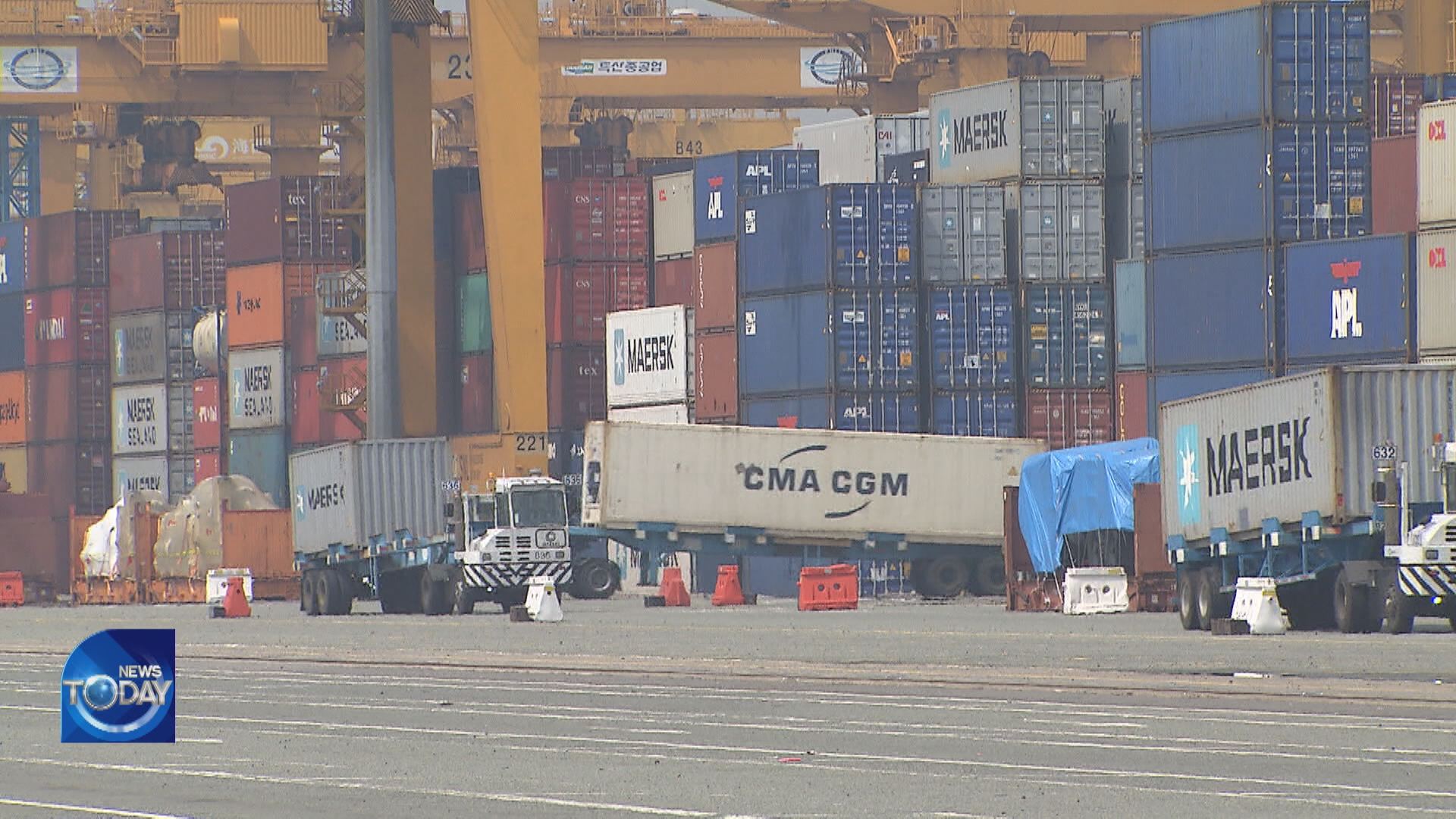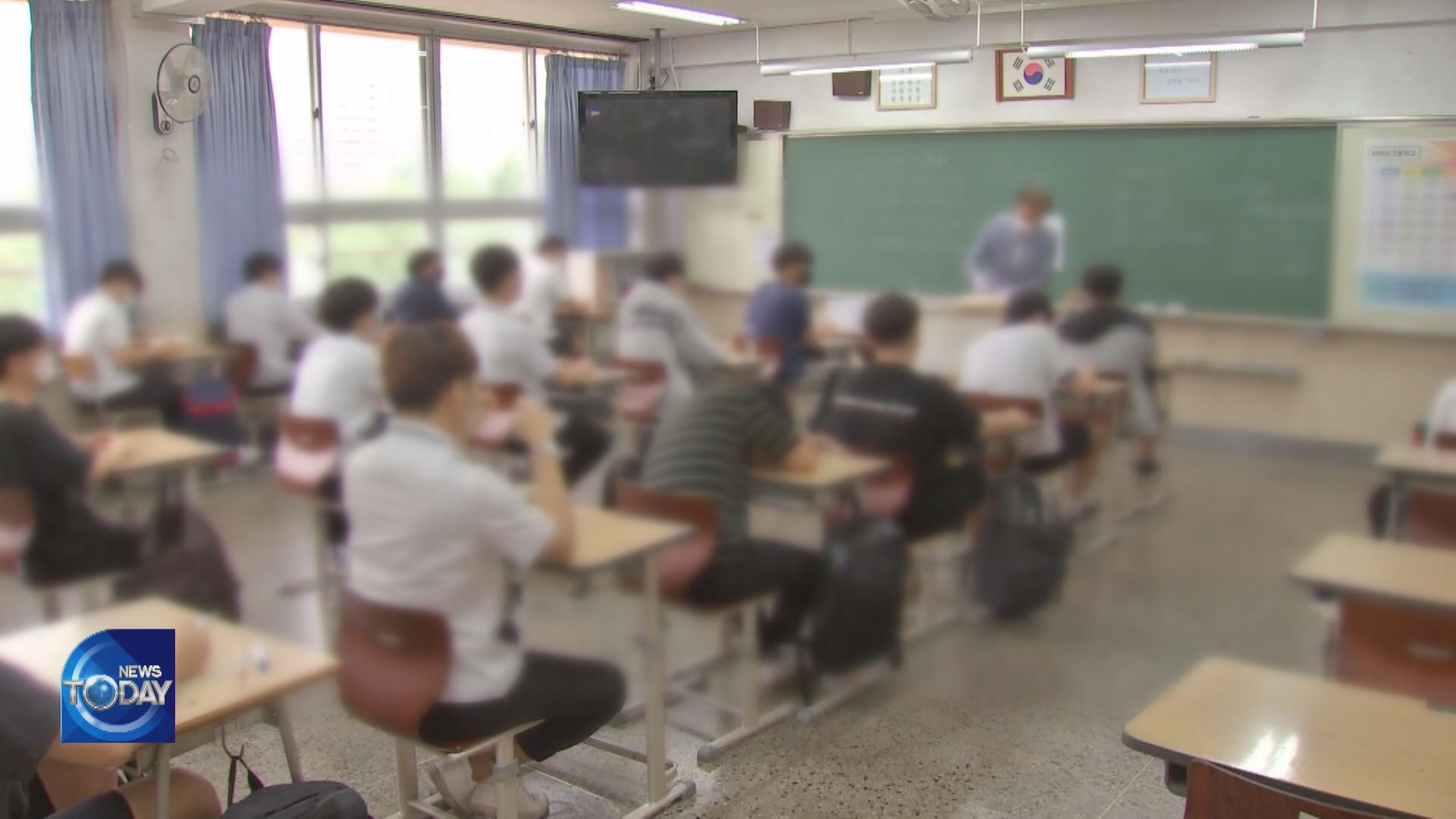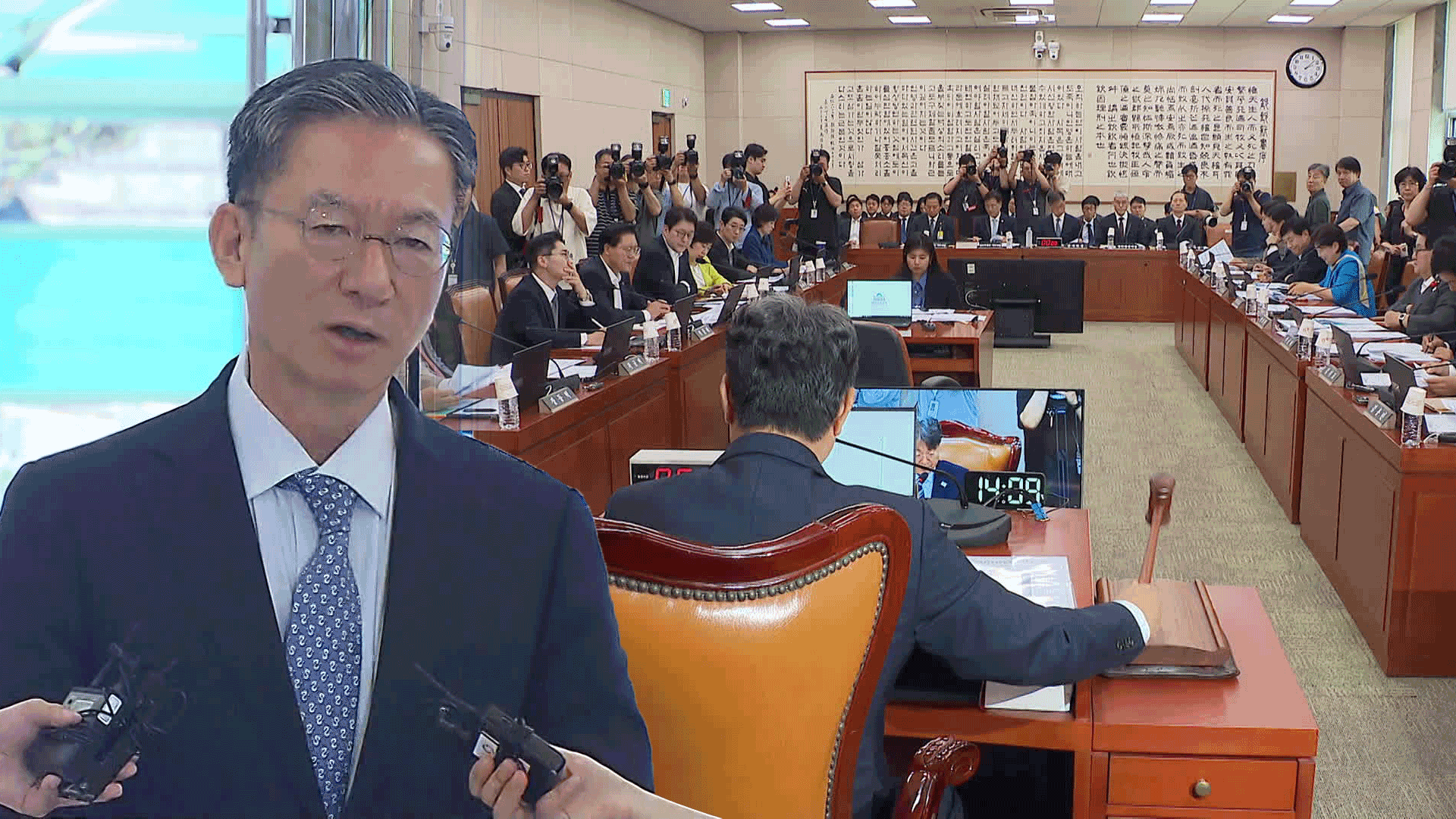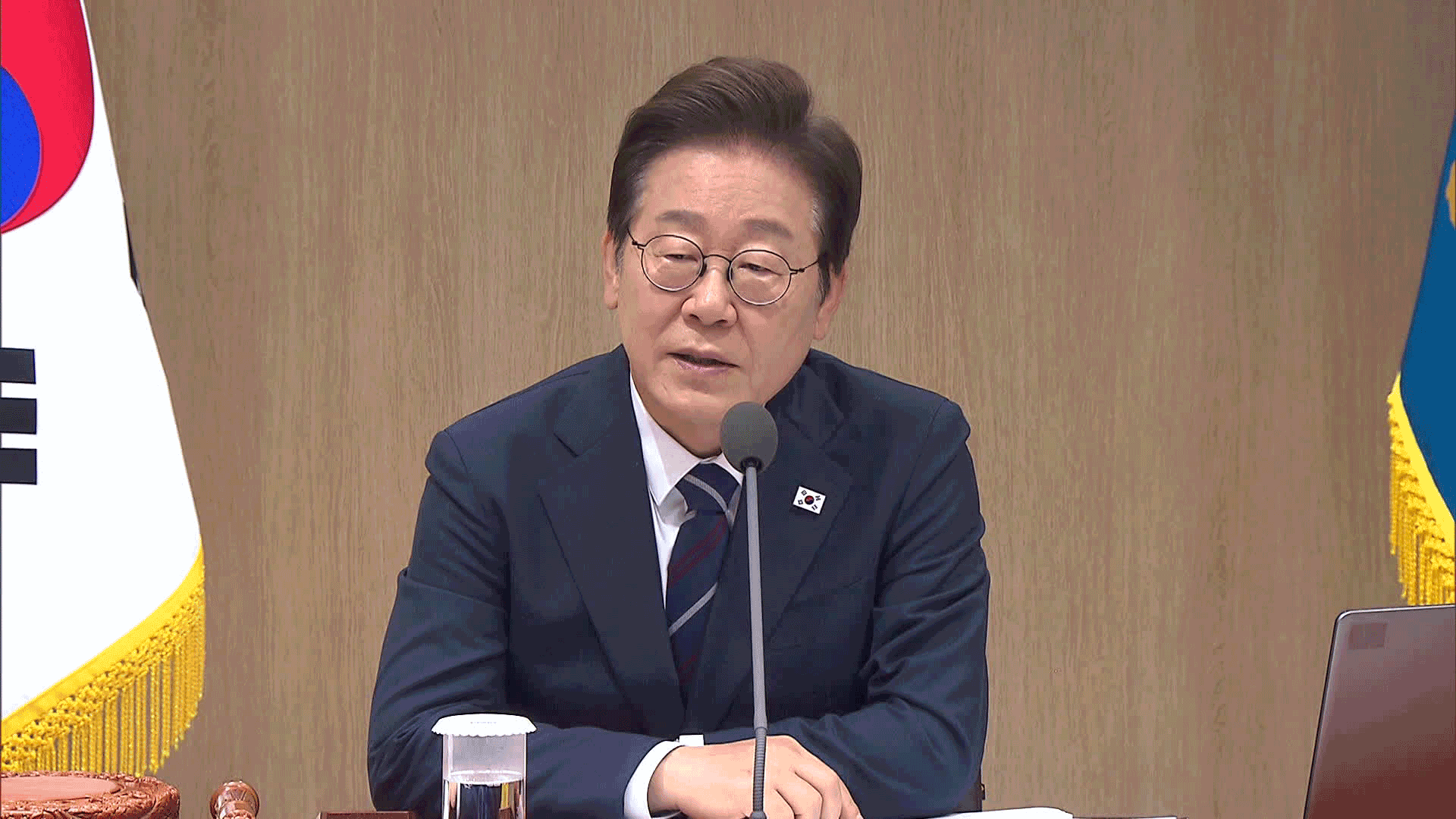RECORD HIGH TRADE DEFICIT
입력 2022.07.04 (15:04)
수정 2022.07.04 (16:45)
읽어주기 기능은 크롬기반의
브라우저에서만 사용하실 수 있습니다.
[Anchor Lead]
The government has come up with emergency measures to help exporters facing challenges from surging energy and raw material prices stemming from the conflict in Ukraine. It will expand trade financing to small and medium sized firms by more than 40 trillion won and also seek active measures to ease logistical disruptions.
[Pkg]
South Korea posted exports of over 350 billion dollars in the first half of the year, reaching an all time high. However imports outpaced exports, resulting in a trade deficit of 10.3 billion dollars, or about 13 trillion won. The deficit is larger than the previous record of 9.1 billion dollars recorded in the first half of 1997. This is because energy imports, such as crude oil, gas and coal, surged 88% on-year in the first six months. What's concerning is this trend is likely to continue in the second half.
[Soundbite] Choo Kyung-ho(Finance Minister) : "Tough conditions for exporters are also expected in H2 amid continued supply chain uncertainties due to the Ukraine war and the high cost of logistics via air and sea."
The government has decided to increase trade financing provided to small and medium sized firms by more than 40 trillion won this year. It will also seek various measures to ease disruptions in logistics for SMEs.
[Soundbite] Lee Chang-yang(Minister of Trade, Industry and Energy) : "At least 4 more vessels will operate each month on a temporary basis until global maritime freight charges stabilize. Ships exclusively for SMEs will be supplied more by an additional 50TEU per week."
Efforts will also be made to improve the fundamentals of Korean exports, considering the global trade volume itself is shrinking amid slowing growth in major economies including the US. Such efforts include finding new markets in Europe and Southeast Asia and cultivating new export items, such as high-tech materials, components and equipment. The government is set to announce this month a set of measures to support the semiconductor industry. On July 13, it will hold a joint public and private sector meeting to examine the current state of exports and discuss ways to reduce the trade deficit.
The government has come up with emergency measures to help exporters facing challenges from surging energy and raw material prices stemming from the conflict in Ukraine. It will expand trade financing to small and medium sized firms by more than 40 trillion won and also seek active measures to ease logistical disruptions.
[Pkg]
South Korea posted exports of over 350 billion dollars in the first half of the year, reaching an all time high. However imports outpaced exports, resulting in a trade deficit of 10.3 billion dollars, or about 13 trillion won. The deficit is larger than the previous record of 9.1 billion dollars recorded in the first half of 1997. This is because energy imports, such as crude oil, gas and coal, surged 88% on-year in the first six months. What's concerning is this trend is likely to continue in the second half.
[Soundbite] Choo Kyung-ho(Finance Minister) : "Tough conditions for exporters are also expected in H2 amid continued supply chain uncertainties due to the Ukraine war and the high cost of logistics via air and sea."
The government has decided to increase trade financing provided to small and medium sized firms by more than 40 trillion won this year. It will also seek various measures to ease disruptions in logistics for SMEs.
[Soundbite] Lee Chang-yang(Minister of Trade, Industry and Energy) : "At least 4 more vessels will operate each month on a temporary basis until global maritime freight charges stabilize. Ships exclusively for SMEs will be supplied more by an additional 50TEU per week."
Efforts will also be made to improve the fundamentals of Korean exports, considering the global trade volume itself is shrinking amid slowing growth in major economies including the US. Such efforts include finding new markets in Europe and Southeast Asia and cultivating new export items, such as high-tech materials, components and equipment. The government is set to announce this month a set of measures to support the semiconductor industry. On July 13, it will hold a joint public and private sector meeting to examine the current state of exports and discuss ways to reduce the trade deficit.
■ 제보하기
▷ 카카오톡 : 'KBS제보' 검색, 채널 추가
▷ 전화 : 02-781-1234, 4444
▷ 이메일 : kbs1234@kbs.co.kr
▷ 유튜브, 네이버, 카카오에서도 KBS뉴스를 구독해주세요!
- RECORD HIGH TRADE DEFICIT
-
- 입력 2022-07-04 15:04:02
- 수정2022-07-04 16:45:42

[Anchor Lead]
The government has come up with emergency measures to help exporters facing challenges from surging energy and raw material prices stemming from the conflict in Ukraine. It will expand trade financing to small and medium sized firms by more than 40 trillion won and also seek active measures to ease logistical disruptions.
[Pkg]
South Korea posted exports of over 350 billion dollars in the first half of the year, reaching an all time high. However imports outpaced exports, resulting in a trade deficit of 10.3 billion dollars, or about 13 trillion won. The deficit is larger than the previous record of 9.1 billion dollars recorded in the first half of 1997. This is because energy imports, such as crude oil, gas and coal, surged 88% on-year in the first six months. What's concerning is this trend is likely to continue in the second half.
[Soundbite] Choo Kyung-ho(Finance Minister) : "Tough conditions for exporters are also expected in H2 amid continued supply chain uncertainties due to the Ukraine war and the high cost of logistics via air and sea."
The government has decided to increase trade financing provided to small and medium sized firms by more than 40 trillion won this year. It will also seek various measures to ease disruptions in logistics for SMEs.
[Soundbite] Lee Chang-yang(Minister of Trade, Industry and Energy) : "At least 4 more vessels will operate each month on a temporary basis until global maritime freight charges stabilize. Ships exclusively for SMEs will be supplied more by an additional 50TEU per week."
Efforts will also be made to improve the fundamentals of Korean exports, considering the global trade volume itself is shrinking amid slowing growth in major economies including the US. Such efforts include finding new markets in Europe and Southeast Asia and cultivating new export items, such as high-tech materials, components and equipment. The government is set to announce this month a set of measures to support the semiconductor industry. On July 13, it will hold a joint public and private sector meeting to examine the current state of exports and discuss ways to reduce the trade deficit.
The government has come up with emergency measures to help exporters facing challenges from surging energy and raw material prices stemming from the conflict in Ukraine. It will expand trade financing to small and medium sized firms by more than 40 trillion won and also seek active measures to ease logistical disruptions.
[Pkg]
South Korea posted exports of over 350 billion dollars in the first half of the year, reaching an all time high. However imports outpaced exports, resulting in a trade deficit of 10.3 billion dollars, or about 13 trillion won. The deficit is larger than the previous record of 9.1 billion dollars recorded in the first half of 1997. This is because energy imports, such as crude oil, gas and coal, surged 88% on-year in the first six months. What's concerning is this trend is likely to continue in the second half.
[Soundbite] Choo Kyung-ho(Finance Minister) : "Tough conditions for exporters are also expected in H2 amid continued supply chain uncertainties due to the Ukraine war and the high cost of logistics via air and sea."
The government has decided to increase trade financing provided to small and medium sized firms by more than 40 trillion won this year. It will also seek various measures to ease disruptions in logistics for SMEs.
[Soundbite] Lee Chang-yang(Minister of Trade, Industry and Energy) : "At least 4 more vessels will operate each month on a temporary basis until global maritime freight charges stabilize. Ships exclusively for SMEs will be supplied more by an additional 50TEU per week."
Efforts will also be made to improve the fundamentals of Korean exports, considering the global trade volume itself is shrinking amid slowing growth in major economies including the US. Such efforts include finding new markets in Europe and Southeast Asia and cultivating new export items, such as high-tech materials, components and equipment. The government is set to announce this month a set of measures to support the semiconductor industry. On July 13, it will hold a joint public and private sector meeting to examine the current state of exports and discuss ways to reduce the trade deficit.
이 기사가 좋으셨다면
-
좋아요
0
-
응원해요
0
-
후속 원해요
0










![[HEADLINE]](https://news.kbs.co.kr/data/news/title_image/newsmp4/news_today/2022/07/04/10_5500902.jpeg)



![[단독] 골프연습장 아니라더니<br>…‘한남동 골프연습장’ 도면 입수](/data/news/2025/07/01/20250701_Uh8Jnu.png)


이 기사에 대한 의견을 남겨주세요.